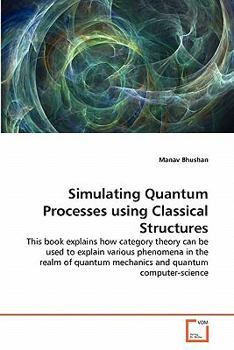Simulating Quantum Processes using Classical Structures: This book explains how category theory can be used to explain various phenomena in the realm of quantum mechanics and quantum computer-science
In earlier work, it has been shown that Frobenius algebras with certain properties can be used to simulate classical data. They are especially useful because in their definition itself they incorporate the biggest difference between classical and quantum data- which is the absence of copying and deleting operations for arbitrary quantum states. In later work, it has been shown that a special, commutative, dagger-Frobenius algebra (classical structure) corresponds to an orthonormal basis for a finite- dimensional Hilbert Space. In this paper, we show how classical structures can be used to axiomatize maximally entangled states for two qubits. We then go on explain how this new representation of quantum informatic related protocols using classical structures can be used to encode the flow of quantum data. We explain how this process encodes all the possible observational branches simultaneously, and thus has the ability to tell us the end result that can be achieved in any particular protocol. We end with a summary of the results obtained, and suggestions for future work. This description may be from another edition of this product.
Format:Paperback
Language:English
ISBN:3639345258
ISBN13:9783639345254
Release Date:April 2011
Publisher:VDM Verlag
Length:68 Pages
Weight:0.25 lbs.
Dimensions:0.2" x 6.0" x 9.0"
Customer Reviews
customer rating | review
There are currently no reviews. Be the first to review this work.













